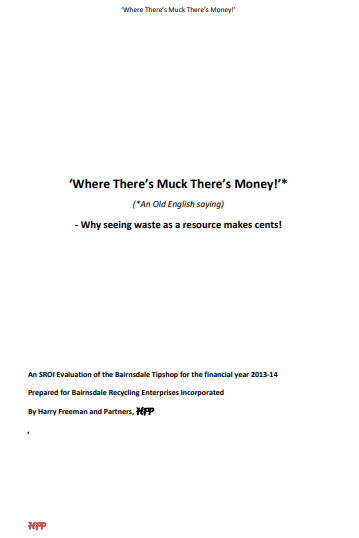Reports Database:
An SROI Evaluation of the Bairnsdale Tipshop for the financial year 2013-14

 Bairnsdale Recycling Enterprises Incorporated is a not for profit incorporated association which has established a social enterprise (trading as the Bairnsdale Tipshop) to tackle some significant social and environmental issues in its local area. It operates in Bairnsdale, a small city (population ca 13 000) situated in the eastern tip of the state of Victoria, Australia.
Bairnsdale Recycling Enterprises Incorporated is a not for profit incorporated association which has established a social enterprise (trading as the Bairnsdale Tipshop) to tackle some significant social and environmental issues in its local area. It operates in Bairnsdale, a small city (population ca 13 000) situated in the eastern tip of the state of Victoria, Australia.
Like many other municipalities in Australia, Bairnsdale has a mounting problem in dealing with the waste that is created in the area. At the same time it is a region which at the time of the inception of the program had a higher unemployment rate than the average for the state. In particular, the local youth unemployment rate was, and remains, at disturbingly high levels (around 30%).
The original idea for a Tipshop was investigated by representatives of various organisations involved with the local community in 2007 following the construction of a shed at the landfill site by Sustainability Victoria (an agency of the Victorian State Government) and East Gippsland Shire Council. After negotiations with the council it was arranged to establish the shop in the building and the program commenced in 2009. After some modifications to the original concept, the Tipshop has been running in its present form since 2010 as a viable concern giving employment to previously unemployed local people. By the period of time analysed in this report (July 2013 to June 2014), the Tipshop was employing six people on a part time basis (including a business manager who was not long term employed) and generated an income of $188 000 in the year covered by the investigation.
The Tipshop has developed a model which involves taking goods that would have otherwise been put into landfill and offering them for sale in the shop set up at the landfill site. An important part of the operation, which has been crucial in its success financially, is that many of these goods have value added to them. This has been achieved by checking (testing and tagging) electrical goods to see that they are safe for resale and repairing or servicing goods such as lawn mowers and bicycles which increases their resale value significantly.
Another aspect of the program is that many of the staff employed at the shop have brought some skills to the operation which are useful to it. This has meant that the program has been more selective in choosing staff than originally anticipated. Significantly, it has meant that a minority of the employees has been drawn from the original target group of the young unemployed (those aged between 15 and 24 years old).